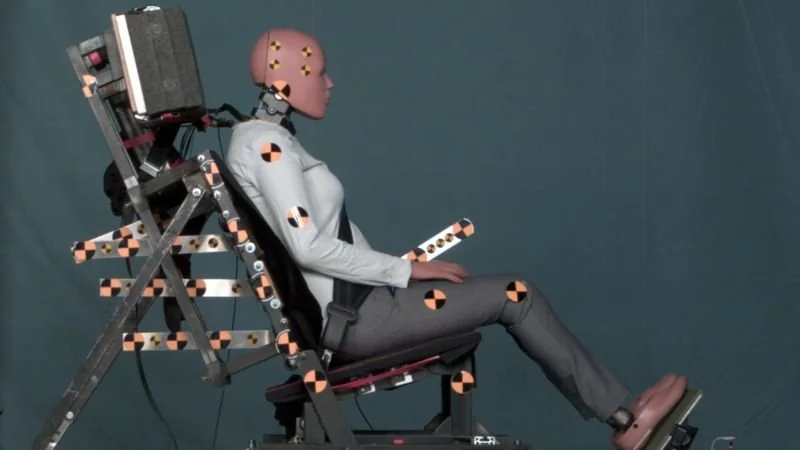Crash dummies and robot arms: How airline seats are tested

In a warehouse building in a quiet town in Northern Ireland, a robot arm is opening and closing an airplane meal table over and over again.
It has been programmed to carry out this mundane task no fewer than 28,000 times, day and night, for more than a week. And it won’t even get a bag of peanuts.
“We can measure the force that the robot’s having to apply to that,” says Gerald King, head of engineering at Thompson Aero Seating in Banbridge. “Is it increasing? Which means more friction.”
Thompson makes first class and business class seats – the expensive kind usually at the front of passenger aircraft, with their own privacy-simulating enclosures, built-in entertainment systems, and heaps of leg room.
The company has various machines for testing the longevity and safety of such seats. Including a new £7.5m facility, opened last autumn, where crash test dummies are strapped to a seat and shot down a short track at incredible speeds.
The idea is to ensure that the seat – and passenger – would survive a brief exposure to 16 g’s. It is the only facility of its kind on the island of Ireland.
Perhaps surprisingly, just under one third of the world’s aircraft seats are manufactured in Northern Ireland, according to Invest NI, an economic development agency. Thompson, which was bought by a Chinese company in 2016, is one of a few businesses in the region that specialise in this trade. The firm currently churns out roughly 1,500 seats per year.
Another major Northern Ireland-based supplier of seats is Collins Aerospace, in Kilkeel. There is also Alice Blue Aero, in Craigavon.
One of the largest seat manufacturing companies worldwide is Safran. It has facilities on six continents.
But, thanks to the pandemic, demand for aircraft seats has flip-flopped dramatically of late. When Covid-19 emerged, the aerospace manufacturing industry slowed to a crawl. Globally, companies laid off thousands of workers. Thompson, for one, cut its own workforce in half, and has faced financial losses running to many millions.
The world has at last opened up again, but seat manufacturers have not been able to find all the skilled workers they need, meaning that demand, globally speaking, is outstripping supply. It is a “very difficult situation”, Airbus’ chief executive said in June, referring to the slow supply of seats and other cabin parts.





